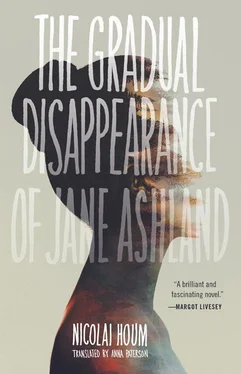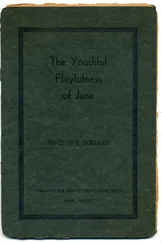There were aspects of life in Norway that reminded Jane of stories told to her by a couple of friends who had lived in the Middle East.
On the highway, Camilla fell asleep with her head dangling between the seats. Jane gently pushed her back until she was supported against the backrest and then allowed her arm to lie for a moment across the girl’s chest. She could sense the beating of Camilla’s heart beneath the paper-thin material of her tracksuit. It felt as if she’d catch fire if she kept her arm there too long.
And then everything went to pieces. When they arrived at the gym, she was reminded of how stupid she could be at times. So dense, it was a miracle that she had managed, over and over again, to convey the opposite to her readers and the literary critics. The moment she swung the car into the parking place, it was obvious what kind of situation she had put herself in. She saw the clusters of giggling girls disappearing in through the wide glass doors. Some of them were as young as five. She clutched the steering wheel and could feel her pulse beating under her nails.
The pills were in her suitcase. In the guest room.
“I’ll wait here,” she said.
Camilla said, with her head tilted sideways, “You can’t wait here. I’ll be training for two and a half hours.”
“No problem at all.” She sounded as snappy as if at a public reading and the organizer had forgotten to provide water.
“No, please. Come in and watch—you must. You’ll get icy cold in the car.”
“I’ll be fine, just fine. I can listen to your music.”
Jane looked at the recess on the dashboard. Camilla’s cell phone was no longer there.
Camilla took the phone from her pocket and handed it over.
“It actually has the songs for my training program but I guess that’s all right. Usually, they’re on the CD player as well…” She stopped and then went on. “Don’t you want to watch me?”
Jane swallowed several times before she met Camilla’s eyes. Smiling seemed to rip her face apart.
“Yes, of course I do.”
BY EARLY SPRINGof 1996, the year Jane met Greg, more than thirty churches with predominantly black congregations had caught fire in the South. In February, the Washington Post reported that the majority of these incidents had indisputably been cases of arson. NationsBank, based in the South, had offered half a million dollars to anyone providing information that led to the arrest and sentencing of the perpetrators. In June, President Clinton called for action: We must all do our part to end this rash of violence and went on to say I have vivid and painful memories of black churches being burned in my own state when I was a child (later, doubts were raised that there had in fact been any outbreaks of racially motivated church arson in Arkansas during Clinton’s childhood).
New York University, where Jane was enrolled as a student of literature, was far from Tennessee and Alabama, but a combination of opportunity and an attack of bad conscience meant that she was swept along in a peaceful march of antiracist demonstrators on their way to the United Nations building. She and her friend Alice had been to a Gustav Klimt exhibition at the Frick. On the walk back to her room on Broome Street, she found herself going against the flow of the march and felt like a distressed fish swimming against the shoal. For a while, she zigzagged along the sidewalk, pressed herself against the walls of buildings, and stood for quite a long time behind a fire hydrant with a growing sense of being somehow in the wrong, just because she wanted something different from everyone else. That very morning, she and Alice had had a philosophical discussion over breakfast—a familiar mix of Sunday morning gloom and youthful self-absorption—and had agreed that they were both creatures of the Western world, self-centered and privileged people who never helped anyone but themselves, and hardly even that.
Finally, Jane gave up. It was pointless saying things like “I’m sorry” or “I’ve gone the wrong way.” Instead, faced with the crowd of humanity, she joined them and muttered the slogan to herself but in unison with the others: No Justice, No Peace .
When the march passed Grand Central Station, her eye was caught by a tall young man who was walking just a few steps ahead of her and spoke the words with passion. His hair was halfway to his shoulders and he looked like Abraham Lincoln, if it was possible to imagine the sixteenth president as a twenty-something student who had never carried the responsibility for a nation at war, and dressed like Kurt Cobain. She had seen that guy before but couldn’t think where. Pondering this, she took care not to lose sight of him. Eventually, they came to march side by side and, in the surrounding chaos that made looking every which way quite reasonable, their eyes often met. On East 45th Street, the young man turned to Jane and shouted a question into her ear. Did she know where they were going?
“Don’t you know?” she shouted back.
“No, I just came along for the ride. I was on my way home.”
“You’re kidding?”
“I had no idea about the demonstration.”
She shook her head.
“But now I’m here, which is a good thing.”
“We’re glad you feel the same way,” she said.
It took a few weeks before Jane admitted that they had been in the same situation. Meanwhile, they had slept with each other twice and he had bought her a ring from a vending machine, knelt in front of her in the line to a Stone Temple Pilots show, and asked her to be his lover. It turned out that they were not only at the same university but actually in the same department. Greg had joined the creative writing major and definitely had ambitions to become a writer. Jane was in her second year of her English literature degree and shared his ambition but kept it secret. The similarities between them didn’t end there. They came from the same state, though Greg had grown up in La Crosse. Both used to watch Scooby-Doo after school and, just like Jane, Greg stayed with the programs that followed it, Gilligan’s Island and The Love Boat , despite the mental pain they caused. Separately, they had both flirted with vegetarianism but only in short bursts because they read the same anxiety-making article in New Scientist about the crucial role of amino acids in brain development (they had both come across the magazine in a dentist’s waiting room). As for beers, Greg preferred Pabst Blue Ribbon, a drink to which Jane’s father had devoted his life, more or less. They discovered that Jane, on her first independent holiday, had stayed at a campsite not at all far from Greg’s childhood home and had actually bought painkillers in a pharmacy run by Greg’s uncle. Before his stroke, that was. And it came back to her where she had seen Greg before. Not in the university—their schedules scarcely overlapped at all—but at a reading in the KGB Bar. It had been hard for her to take her eyes off him on that occasion, too. Later, they read in the Militant (Greg, who was obviously a socialist at the time, subscribed to it) that some 1,200 people had marched in the demo against the church arsonists. And the two individuals who were meant for each other happened to join the procession at exactly the same place! Neither Jane nor Greg was especially religious or superstitious, but they were both at the age when you can’t help letting yourself suspect that there is a plan for the universe and that your name is at least mentioned in it.
Jane knew after their first night together in her place on Broome Street that she wanted to marry him. She wanted a quick, unannounced ceremony in some place with no connections to either of them. Partly because she found that scenario much more romantic than dressing up like a cupcake and proceeding to do exactly what billions of couples had done before. But her main reason was to escape her parents who would, without fail, envelop the whole event in the usual murk of pointless grief and disapproval. She saw all this clearly after having woken up before him, rolling over on her side, and, supporting herself on her elbow, looking at him in the dust-laden light. She examined his face with its faint gray shadow around the mouth and chin but deep in childish sleep. A long, slender arm stuck out from under the blanket. His fingers twitched. They had none of the repulsiveness of other men’s fingers.
Читать дальше












